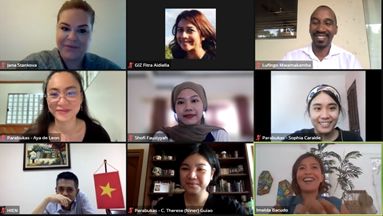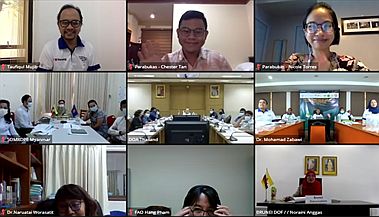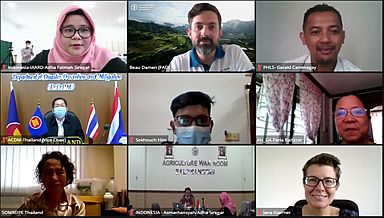The 6th ASEAN-CRN Annual Meeting Regional cooperation for climate-smart solutions in food, agriculture and forestry amid the pandemic.
The ASEAN Climate Resilience Network (ASEAN-CRN) conducted their 6th Annual Meeting virtually on 7 April 2021, after a year of delay due to the pandemic. Despite the challenges all ASEAN countries are currently facing, members of the ASEAN-CRN met in good spirits under the leadership of the host of this year’s meeting, the Malaysian Agricultural Research and Development Institute (MARDI), which ensured to bring a flavor of Penang to the virtual meeting space.
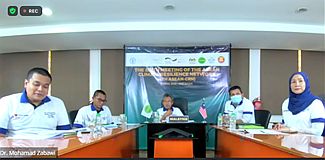
The Annual Meeting provided all stakeholders to review and report on Network activities and plan future actions, and also created a space for exchange between Network members and supporters and for reflection on the Network’s own institutional structure. A special highlight was the entertaining and informative videos MARDI and Thailand, as the Chair of ASEAN-CRN, had prepared for the meeting, supported by the Climate-Smart Land Use in ASEAN (CSLU) project.
The Network made progress toward the objective of bringing support closer to demand in the Southeast Asian region with regard to food security and climate change and thus helping to implement the Strategic Plan for ASEAN Cooperation in Food, Agriculture and Forestry (FAF) (2016-2025) and the ASEAN Comprehensive Recovery Framework (ACRF). The 50 partcipants who attended the meeting were national focal points of ASEAN member states, representatives of different ASEAN working groups, staff from the ASEAN Secretariat, and development and research partners.
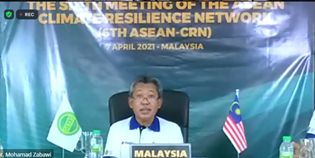
Director-General of MARDI
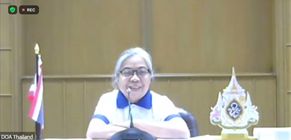
Virtual exploration of Penang
In his opening remarks, Datuk Dr Mohamad Roff Mohd Noor, Director-General of MARDI, conveyed his appreciation of ASEAN-CRN stakeholders who remained committed to working together to contribute to food security and climate change mitigation and adaptation in the region. He remarked on the strong bond between CRN focal points ‘not only as a group of countries, but as a family’.
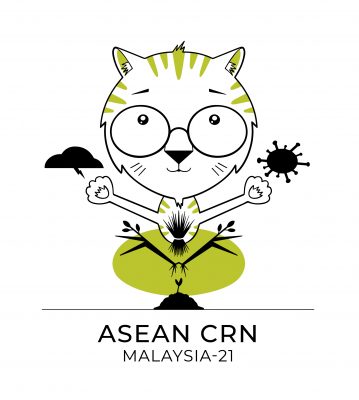
To commemorate the special historic moment, Malaysia as host presented Tee Tee, the Malay tiger, a virtual mascot who symbolises the spirit of ASEAN-CRN and its commitment to sustainable agriculture, food security, climate action and COVID-19 recovery.
Acting as facilitator for the opening ceremonies was Malaysia’s CRN focal point, Mohammad Abdul Hariz Rahman, took the participants for a virtual exploration to Penang’s famous culinary selection. Penang was the selected venue for the 6th Annual CRN Meeting had not the pandemic occurred, and videos clearly showed what the participants are missing out on gastronomic. During the closing ceremonies, he also introduced participants to a virtual field trip to the MARDI facilities and initiatives, by showcasing climate-smart agriculture (CSA) practices in the country, as a substitute to the physical activity that normally occurs after every CRN Annual Meeting.
Dr Margaret Yoovatana from the Thai Ministry of Agriculture and Cooperatives, representing the ASEAN-CRN Chair, then reported and recapped the Network’s journey, including process and achievements in the form of a video presentation, including its latest activities since the last ASEAN CRN Meeting in Laos in 2019.
Forging ahead together
Dada Bacudo, ASEAN-CRN Coordinator, explained and presented the results of the needs and support matching exercise that were conducted prior to the meeting. The results which reflected goals and ambitions to contribute to various ASEAN frameworks on climate change and food security were validated during the breakout session of the meeting. This will then form the basis for the development of a new ASEAN-CRN workplan.
Through five breakout sessions, focal points and development partners gave inputs on potential topics and activities of ASEAN-CRN validating or prioritizing results of the matching exercise. The five focus areas were based on the FAF Strategic Plan 2016-2025 and the ACRF:
(1) Ensuring sustainable production quantitatively and qualitatively
(2) Increasing resilience to climate change, natural disasters and other shocks
(3) Strengthening joint ASEAN approaches on international and regional issues
(4) Promoting high-value industries, sustainability and productivity in agriculture
(5) Other support to the ASEAN Recovery Framework.
Lufingo Mwakamba, of the Global Alliance on Climate Smart Agriculture (GACSA), gave three guide questions for the discussions that will allow to define the gaps and technical areas that CRN need to focus on, how CRN can increase its impact as a network, and what are partnerships and synergies that need to be unlocked.
Solid concrete convergence points emerged from the discussions. To address sustainable production in agriculture and high-value industries promotion, for example, the importance of digitalisation in agriculture, including marketing, improving engagement with consumers and partnership with the private sector and capacity building for smallholder farmers and small and medium-sized enterprises (SMEs) for services to improve farmers’ resilience.
The participants suggested to link with the work plan of the ASEAN Agreement on Disaster Management and Emergency Response (AADMER), linking it with CRN’s multi-country proposal on agriculture investments to the Green Climate Fund. A knowledge exchange to learn about local level government climate change adaptation planning and risk financing were also suggested. Complete results of the matching and breakout session exercises will soon be sent to all participants.
Institutional sustainability of ASEAN-CRN
After bidding goodbye to the external guests attending the Annual Meeting, the CRN focal points discussed a proposal circulated by Thailand as the ASEAN-CRN Chair on
19 February 2021 for amending the Terms of Reference of the Network, with a focus on establishing an official Coordination Unit within a national or regional institution. The aim of this initiative is to make the institutional structure more sustainable and provide a clearer mandate to this important support body.
ASEAN-CRN members generally welcomed the proposal and exchanged views about the way forward. In this context, focal points highlighted the need for broader reflection about the evolution of ASEAN-CRN and its vision and mandate for the future. A suggestion to reflect and review CRN mandate was mentioned. Participants agreed that further discussion was needed and that the ASEAN Working Group on Agricultural Research and Development (ATWGARD), to which CRN reports, will be informed about this process.
Joint support
The 6th ASEAN-CRN Annual Meeting was jointly supported by the CSLU project, with funding from the German Federal Ministry for Economic Cooperation and Development (BMZ), and implemented by the Deutsche Gesellschaft für Internationale Zusammenarbeit (GIZ) GmbH, the UN FAO Regional Asia Pacific Office, and the Global Alliance for Climate Smart Agriculture (GACSA).
For Annual Meeting material, please visit: The ASEAN-CRN 6th Annual Meeting Event Documentation page.
Photo: GIZ/Diella Dachlan
